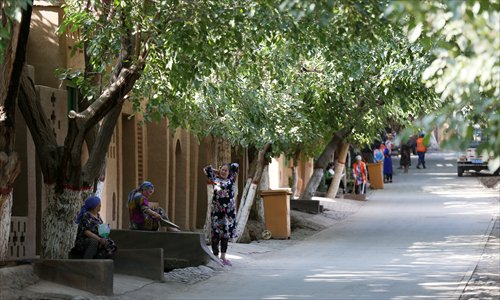
Uyghur people living in Grape Valley's Baiximaili village are expecting to see more visitors in the coming years. (Photo: Cui Meng/GT)
The Xinjiang authorities aim to bring 300,000 residents out of poverty through tourism by 2020. In Turpan, the tourism bureau has already taken a series of measures to help impoverished locals. While the low awareness of tourism among residents, lagging investment and publicity pose obstacles, the government optimistically expects to achieve their goal by the end of 2016.
Ajihan Wushouer was understandably thrilled when her family's annual income doubled to 20,000 yuan ($3,005) in 2014.
The 69-year-old, a local of Grape Valley, Turpan, Northwest China's Xinjiang Uyghur Autonomous Region, had never made so much money in a single year before.
The seven members of her family used to make a living by growing grapes. In 2014, they were offered a new way to make a living - tourism. Since then, selling food to tourists has become the family's important source of income.
On the busiest days, Wushouer can sell about 200 plates of "hand pilaf," a traditional Xinjiang dish made of rice, carrots and lamb. For each plate, she charges 20 yuan.
Wushouer's home was chosen by the local government along with five other houses in Baiximaili village as pilot places to test how effective tourism is at alleviating poverty, according to Guli Tursun, an official with the village's management committee.
Grape Valley is a 5A scenic spot (the highest rank for a scenic spot in China), which is renowned for its high-quality grapes.
The chosen houses provide tourists with meals, tour guides and accommodation.
"Before carrying out the project (of eliminating poverty through tourism), the dirt road in the village was replaced with a concrete road and the sewage system was renovated. We also taught them how to run hospitality services," Tursun said.
Seeing and envying the success, now more and more local households are joining the trend of developing tourism to alleviate poverty. "So far we have 32 households in the village that provide tourism services," she told the Global Times.
The pilot project in Grape Valley is one small part of the Xinjiang tourism administration's larger plan - to help 300,000 people in Xinjiang escape poverty through tourism by the end of 2020, according to the local news website xjbs.com.cn.
Though they are optimistic about the future, villagers and officials told the Global Times that the difficulty of getting the word out about local tourism, as well as the low general awareness in Xinjiang of the money that can be made through tourism and the lack of investment all pose obstacles on their road.
Lifting out of poverty
In May, Premier Li Keqiang addressed the First World Conference on Tourism Development hosted in Beijing, at which he vowed that the government will help bring 12 million people out of poverty in the next five years through tourism development, Xinhua reported.
This echoes the country's greater plan to help all of China's poor out of poverty by 2020.
As of the end of 2014, there were 70.17 million people in rural areas living under the official poverty line. Based on the 2010 price standards, the line is set at an annual income of 2,300 yuan.
While Grape Valley is known nationally for its produce, Xie Feng, the director of the Gaochang district tourism bureau in Turpan, noted that as the population here is so dense and there is so little arable land, there is little space to bring more people into the industry.
Wushouer said that before the family barely bought anything in order to save money.
"We didn't have money. So we didn't have any choice," she said.
At the gate of Wushouer's house, there is a silk banner indicating that boxer Zou Shiming and his son stayed here while filming the popular reality show Dad, Where are we going?
"After the show, many people come to visit my house. But I don't dare to charge them money. I didn't know whether this is legal or not," she said, before taking out a photo of her with Zou and his son.
Zou's son, dressed in fashionable clothes, stands in sharp contrast with her own grandsons, who were running in the yard, naked.
"Our finances have improved after developing tourism," she said. "I don't have enough room to let people stay here. I just hope there will be a steady flow of tourists for my meals."


















































